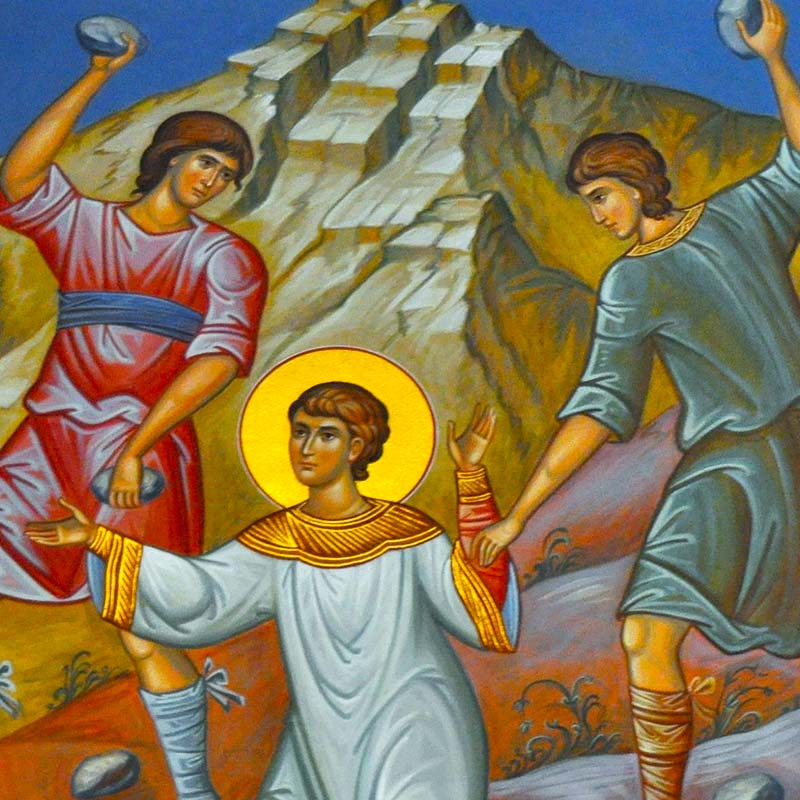
Dear friends, before sharing a brief reflection on the liturgy of Christmas week, I would like to wish you all a blessed Christmas season and a hope-filled New Year in 2024.
It has been a busy couple of weeks in the friary, especially in the office where the novena Mass cards were much in demand. Thanks to those who supported our way of life by sending religious themed cards to family and friends. May those who received and those who sent be equally blest.
The friars are deeply grateful to the team of volunteers who gave generously of their free time to deal so courteously with the daily queues.
We appreciate likewise our many friends who prepared the church and participated in the ceremonies which went smoothly and relatively serenely (with the exception of some really hyperactive children at the Christmas Eve Mass: “suffer little children to come unto me …”). The community is taking a rest this week, attempting to do justice to all the sweet things sent in by our benefactors. It’s hard, but we have to do our duty, not wishing to disappoint the givers!
And now, down to something serious as I mention something that struck me about the feast-days and their readings this week.
We had hardly finished our joyful carol singing, greeting the Christ-Child, when the liturgy dragged us to our senses with the commemoration of the martyrdom of St Stephen. He got into a spot of bother arguing with a group of foreign Jews visiting Jerusalem.
In the story from Acts 6-7, St Luke drops an ironic hint by mentioning the name of their synagogue, “The Synagogue of Freedmen” (6:9). They were supposedly slaves who were now free. But are they? Not at all! They are full of fury at what Stephen is saying, to the point of grinding their teeth.

The passion of anger possesses them so that they are closed to the message of the truth given to Stephen by the Holy Spirit. The same rage is felt by the members of the Sanhedrin, before whom Stephen is dragged for judgment.
They “shouted out, stopped their ears with their hands; then they rushed at him, sent him out of the city and stoned him” (Acts 7:56-57). And yet, Stephen being guided by the Spirit is free, free to forgive his enemies, and free to offer up his life willingly to God (vs. 59-60).
And what is most surprising to me is that these are religious people, sincere in their beliefs, including Saul. They believe they are doing the right thing, serving God, defending the truth as they see it. But how mistaken they are! Their seemingly “righteous” anger is really an example of religious bigotry, which has bedevilled religious groups for centuries up to the present day.
We must continue to pray for a spirit of religious tolerance in our world today, while witnessing to the truth in a peaceable way.
A different, but similar kind of fury is evidenced in the story of the Holy Innocents described by Matthew in his second chapter. The similarity lies in the detail that Herod is partly motivated in killing the infants because: “he had been outwitted by the wise men” (v.16) who have not returned to give the location of the new “King of the Jews.”
Like a spoiled child who does not get his own way, he will try to ‘get even’ and goes on his murderous rampage. He is a bit like those “Freedmen” who felt anger at being defeated in their arguments with Stephen.
And, yet he is also different from them, in being motivated by his fear of losing power, a fear that historians tell us led him to a killing spree involving his own family.
In the reading from St John’s first letter (Jn 2:3-11) on December 29, we will encounter a typical contrast between light and darkness. Those who live like Jesus, obeying his command to love, are in the light, while those who hate their brothers, those like Herod and the Freedmen, remain in the dark and do not know where they are going (v.9).
The message is easily applied to our current world of furious enemies blindly hitting out at each other, with no end to their animosity in sight. May the Lord bring light to open their eyes to the call to peace – to love, not hate, one’s enemies.
Kieran ofm
